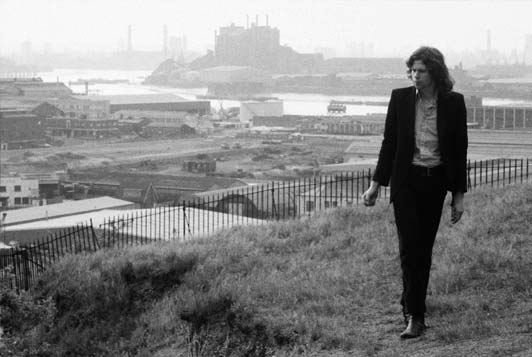By The Landlord
“If I had no sense of humour, I would long ago have committed suicide.” – Mahatma Gandhi
“The thought of suicide is a great consolation: by means of it one gets through many a dark night.” – Friedrich Nietzsche
“Write something, even if it's just a suicide note.” – Gore Vidal
Many of us have been there. I thought about it quite seriously a couple of times when I was younger. I felt completely lost, sinking, twisting in a vortex of churning blackness, tortured by a tendency towards divergent thought and over-creativity, triggered by some terrible events. But somehow, with a little time, I stepped out of myself. I thought, no, this will also hurt other people who don’t deserve it. And there was always tomorrow …
Here at the Song Bar it's traditional to set up any topic with a degree of humour, sometimes frivolous, occasionally profound, but this week might be different. Suicide is a song-related subject I've circled around for some years, but now the time feels right to face it, partly because it’s been requested by this week’s guest playlister, and also because it is currently very … topical. Teenage and younger adult suicide rates have dramatically increased, almost certainly fuelled by the machinery and alienating and paranoia effect of social media with circulated material that glamorises the act, as well as ongoing bullying and prejudice that is not just part of life, but has now also become as much a political tool.
And of course there are many great songwriters who have more than considered it, and indeed taken their own lives, but perhaps also songwriting has saved others. “A book is a suicide postponed," said the Romanian philosopher Emil Cioran, and perhaps many songs have also served that purpose. Yet often that is not enough, with recent and tragic examples of performers ending their lives, from the Prodigy's Keith Flint only this week, and last Scott Hutchison of Frightened Rabbit, and Chris Cornell. The past is littered with other tragic losses, including Ian Curtis, Nick Drake, Fleetwood Mac founder Bob Welch, Del Shannon, and of course, most famously of all, Marilyn Monroe. And while there have been many other early deaths, while not being suicide as search, more accidental, may have been fuelled by wilfully self-destructive behaviour that comes with the highs and lows of being a performer.
Ian Curtis, 1956-1980
But the suicide of music stars, while they may grab headlines, are no more tragic than for those who more anonymous. Pain is pain. Suicide, alongside mental health problems, are a growing cause of death, especially in certain demographics – younger men are on average four times more likely to kill themselves than their female counterparts, yet women are more likely to self-harm. Much of this stems from economic pressure, social repression and prejudice. And suicide rates rise especially at times when we are theoretically meant to be happy – at Christmas, or in the spring.
Many artists, writers and musicians have contemplate suicide at some point in their careers, or are likely to be connected to a friend or lover who goes through with it, so it is no surprise that it may filtered through the medium of song, perhaps as an alternative to, or way of dealing with the issue, or events.
Kurt Cobain, 1967-1994
But some couldn’t stop themselves.. Kurt Cobain wrote an extensive farewell letter, which included, at the end: “I'm too much of an erratic, moody baby! I don't have the passion anymore, and so remember, it's better to burn out than to fade away.” Tony Hancock meanwhile wrote the disturbingly straight: “Things just went wrong too many times.” Ernest Hemingway simply changed the title of one his most famous books: “The sun also sets.”
I think though it would be good this week to avoid the terming “committing” suicide, which suggests, from its older, religious context of committing a sin. That said, the act certainly requires a pretty extreme level of commitment. In fact, Robert Crumb says: “Killing yourself is a major commitment, it takes a kind of courage. Most people just lead lives of cowardly desperation. It's kinda half suicide where you just dull yourself with substances.”
And the novelist David Mitchell put it in Cloud Atlas: “People pontificate, ‘Suicide is selfishness.’ Career churchmen like Pater go a step further and call in a cowardly assault on the living. Oafs argue this specious line for varying reason: to evade fingers of blame, to impress one's audience with one's mental fibre, to vent anger, or just because one lacks the necessary suffering to sympathise. Cowardice is nothing to do with it - suicide takes considerable courage. Japanese have the right idea. No, what's selfish is to demand another to endure an intolerable existence, just to spare families, friends, and enemies a bit of soul-searching.”
Nick Drake, 1948-1974
But others say suicide is not a brave act. Al Green, who found a former lover had killed herself in his apartment, said “suicide is not an answer, it's destruction”, which is what prompted him to change his ways as a womanising soul star and become a minister. Yet religion, while deemed a sin, has also prompted many suicides, from cults to martyrs.
So is it really braver to live, as John Irving put it in The Hotel New Hampshire, and “keep passing the open windows”? “Sometimes even to live is an act of courage,” said the classical philosopher Lucius Seneca, and Albert Camus remarked that “There is but one truly serious philosophical problem and that is suicide.”
Indecision and depression are closely linked. Some who decide to end it all, writing their final note, even report a sense of ease because they have found a direction, even though it is a tragic one. Not being able to commit is perhaps worse. The most famous fictional suicide contemplation is Shakespeare’s Hamlet, whose tortured speech is so famous is an idiomatic cliche – “to be or not to be”. Even though he does not know how to “end the heartache”, it is sitll worth re-reading to unlock the many dilemmas that the mind can present itself:
“To be, or not to be: that is the question:
Whether ’tis nobler in the mind to suffer
The slings and arrows of outrageous fortune,
Or to take arms against a sea of troubles,
And by opposing end them? To die: to sleep;
No more; and, by a sleep to say we end
The heartache and the thousand natural shocks
That flesh is heir to, ’tis a consummation
Devoutly to be wish’d. To die, to sleep;
To sleep: perchance to dream: ay, there’s the rub.”
But then there are those who really do go through it. What thought processes brought them there? “The parts of me that used to think I was different or smarter or whatever, almost made me die,” wrote the prolific, but tortured David Foster Wallace
So sometimes creativity’s process, nor the sense of being special, fails to bring respite. “I have nature and art and poetry, and if that is not enough, what is enough?” wrote Vincent van Gogh.
Some contemplate and attempt suicide many times. Marilyn Monroe, hiding behind all the smiles and poses and personas she felt compelled to put on, said in her autobiography, My Story: “When you're young and healthy you can plan on Monday to commit suicide, and by Wednesday you're laughing again.” Contained in that throwaway, ironic sentence is a whole circularity of pain. And yet it was still a shock when she did it.
Marilyn Monroe, 1926-1962. She mostly smiled in her photographs, but perhaps this was more the real her
Hunter S Thompson took a more decisive turn in his writing. before pulling the trigger: “No More Games. No More Bombs. No More Walking. No More Fun. No More Swimming. 67. That is 17 years past 50. 17 more than I needed or wanted. Boring. I am always bitchy. No Fun — for anybody. 67. You are getting Greedy. Act your old age. Relax — This won't hurt.”
Won’t hurt? Surely suicide really is painful. “The trouble about jumping was that if you didn't pick the right number of storeys, you might still be alive when you hit bottom,” wrote Sylvia Plath in the The Bell Jar. Unfortunately, aged just 30, she took another method in the kitchen.
Yet of course of the treatments for depression, as well as its uneasy bedfellow, is humour. Dorothy Parker died of a heart attack, but often wrote humorously about suicide in her poems as way to keep it at bay:
“If wild my breast and sore my pride,
I bask in dreams of suicide,
If cool my heart and high my head
I think 'How lucky are the dead.”
And in Enough Rope, she dismisses the idea with a distinct snappiness:
“Razors pain you,
Rivers are damp,
Acids stain you,
And drugs cause cramp.
Guns aren't lawful,
Nooses give,
Gas smells awful.
You might as well live.”
Sylvia Plath, 1932-1963
So as serious as it is, suicide can also be treated with a dark humour. Literature and film is full of tragic suicide, from Tolstoy’s Anna Karenina to Moira Shearer in The Red Shoes, but attempted suicide can be blackly comical, not only in fiction. Years ago an acquaintance of mine decided his was going to end it all. And that the best way was to jump under a train. He went down to the mainline station, all ready for the big leap. Unfortunately the day he decided to so this was Christmas Day and, of course no trains were running.
Sadly though, that’s a story that, despite a change of mind that Christmas, didn’t ultimately end well.
In the extraordinarily film Harold and Maude, young Harold is obsessed with death, but is this all really a cry for attention from his mother? Here’s the twist in the tale (or rope) beginning of the film:
And then there’s the tragically bleak, but pathos-filled Aurore in Delicatessen, one of several eccentrics in that building, who sets up an intricate way to go, only for her Heath-Robinsonesque set of contraptions to all suddenly go wrong, or is that right?
Still, suicide, and everything that drives anyone to it is a very serious issue. Here at the Bar we urge anyone who is suffering from depression or any other related issue to always talk to someone, whether that is the Samaritans or any other organisation, or you friends or loved ones. Or, just visit us here, where you’ll always find some gentle balm for the soul, convivial company to ease your pain, and much fabulous music. I hope it helps.
This week’s councillor in chief and sensitively and skilfully sorting out your suicide-related songs, is a very experienced in music, but is making his Song Bar debut - welcome sonofwebcore aka George Boyland! Place your songs in the comments below. Last orders are at 11pm UK time on Monday, for playlists published on Wednesday. Thank you.
New to comment? It is quick and easy. You just need to login to Disqus once. All is explained i in About/FAQs ...
Fancy a turn behind the pumps at The Song Bar? Care to choose a playlist from songs nominated and write something about it? Then feel free to contact The Song Bar here, or try the usual email address. Also please follow us social media: Song Bar Twitter, Song Bar Facebook. Song Bar YouTube. Subscribe, follow and share.






